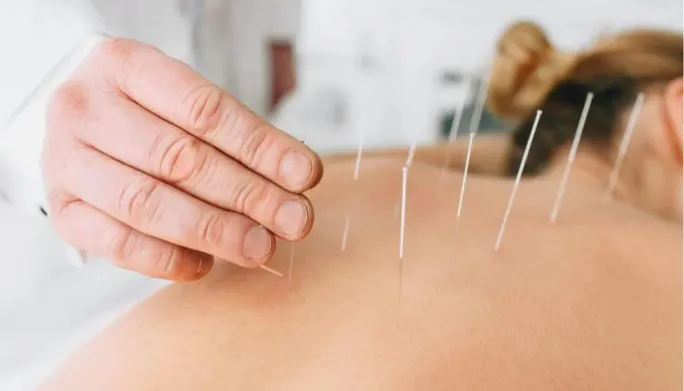Dry Needling In Connecticut

Dry Needling is also known as intramuscular stimulation (IMS) and trigger point dry needling (TDN). It is a safe, effective and efficient treatment used to:
- Relax myofascial trigger points
- Restore normal muscle tones, muscle length, coordination, function and strength
Dry Needling in Connecticut for Pain Relief
Dry Needling is a treatment technique often used by physical therapists to relieve pain. It requires using a sterile acupuncture needle that is inserted through the skin into muscles, tendons, ligaments, and/or close to nerves to immediately reduce pain, decrease muscle tension and increase mobility. Dry Needling is not acupuncture; it is based on a modern scientific study of musculoskeletal and neuromuscular systems. This treatment technique provides an environment that enhances the body’s ability to heal which ultimately reduces pain.
Dry Needling Process
Dry needling involves the insertion and repetitive manipulation of a “dry”, solid filament needle in a trigger point in order to produce an involuntary spinal cord reflex, also known as a local twitch response (LTR). This results in lasting muscle relaxation due to the release of shortened bands of muscle fibers for overactive (tight) muscles or the activation of under-active (weak) muscles. Deactivation of the trigger points can bring immediate relief of symptoms, so the therapist can immediately train the muscles to work with the newly gained pain free range of motion (ROM).
Dry needling is backed by scientific research as well as a modern Western medical practice. Dry needling is a neurophysiological evidence-based treatment technique and an effective treatment for chronic pain and other musculoskeletal conditions such as arthritis, fibromyalgia, plantar fasciitis, tennis elbow, rotator cuff tendonitis, reduced range of motion, repetitive motion disorders, like carpal tunnel syndrome, scar-tissue buildup, disk, and spinal problems, myofascial pain, and a lot more. To achieve the full effects of dry needling, most patients require at least two or three sessions in the office, however, others may require up to six office visits. Depending on your condition, dry needling can be performed once or twice a week.
Dry Needling Vs. Acupuncture
Dry needling is similar to acupuncture in the sense that a dry, solid filament needle is inserted and manipulated under the skin to release endorphins and serum cortisol for pain relief. The difference is that dry needling is based on western neuroanatomy and modern scientific study of the musculoskeletal and nervous systems. Acupuncture is based on traditional Chinese medicine (TCM). It creates balance in the body by influencing the flow of Qi (energy) in pathways called meridians to achieve pain relief and alleviate inflammation.
Benefits of Dry Needling in Connecticut
Dry Needling can provide relief to muscular tissue presenting with these taught points or bands presenting from most causes. These points, colloquially known as “knots” in our muscles, are easy for patients to self-identify. They will often feel like a small marble or ball of tender, hard tissue within the belly of a muscle. They will often also result in immediate referral of pain down a region as if pressing on a nerve when palpated. This therapy is specifically designed to address these tense regions within our muscles and can be utilized in almost any patient with this presentation.
Conditions Treated By Dry Needling in Connecticut
Dry needling has successfully been used to treat a variety of conditions including:
- Head and Neck Pain – including whiplash and headaches, migraines, degenerative joint disease, degenerative disk disease or osteoarthritis
- Otological (Ear) and Opthamological (Eye) Pain – including tinnitus and eye strain
- Dental (Teeth) and Orthodontic (Jaw and Occlusal) Pain – including cavities, temporomandibular joint (TMJ) dysfunction, tooth impaction and root problems
- Shoulder Pain – including rotator cuff muscle tears, bursitis, adhesive capsulitis (frozen shoulder), tendonitis and impingement syndrome
- Elbow Pain – including lateral epicondylitis (tennis elbow) and medial epicondylitis (golfer’s elbow)
- Hand and Wrist Pain – including gamekeeper’s thumb, DeQuervain’s syndrome, carpal tunnel syndrome, degenerative joint disease and osteoarthritis
- Back and Hip Pain – including lumbar degenerative disc disease, arthritic changes and herniated discs
- Knee Pain – including degenerative joint disease or osteoarthritis
- Shin / Ankle / Foot Pain – including shin splints, gout, metatarsalgia and Morton’s neuroma
- Plantar Fasciitis (Heel Pain)
- Acute Tendonitis (also spelled Tendinitis) and Chronic Tendinosis (also known as Tendinopathy)
- Athletic and Sports-related Overuse Injuries
- Post-surgical Pain
- Post-traumatic Injuries, Motor Vehicle Accidents (MVA), and Work-related Injuries
- Other Chronic Pain Conditions – including myofascial pain and myofascial pain syndrome (MPS)
Dry Needling Results
Most patients attempting Dry Needling will notice decreases in their symptoms immediately. Due to the various causes of tender points such as muscular overuse, stress, or tissue trauma, additional interventions like targeted tissue loading through resistance training, flexibility training, mindfulness activities, and gradual exposure programs may be necessary to maintain these decreases and multiple sessions of intervention may be required over time to maintain relief depending on the cause and chronicity of your pain. You and your provider will be able to assess these causes and factors at your initial evaluation to determine an individualized plan of care to optimize your results with Dry Needling!
You Can Count On Us
Dry Needling is a powerful treatment technique that when in conjunction with our other physical therapy treatments, can help you relieve your pain and improve your function quickly. Contact us today to learn more about our dry needling therapy.

